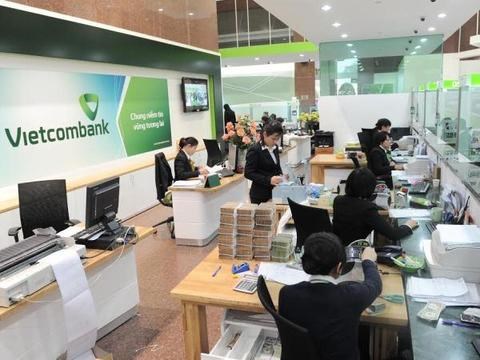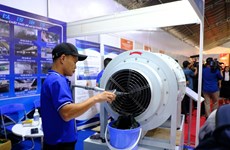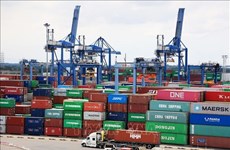Banks upbeat about charter capital hike in 2020
Banks, especially State-owned banks, are expected to increase their capital significantly this year as they are allowed to retain profits or pay dividend in shares instead of cash as previously.
 Banks, including Vietcombank, expect to use their high profits last year to increase capital in 2020. (Photo: VNA)
Banks, including Vietcombank, expect to use their high profits last year to increase capital in 2020. (Photo: VNA)Hanoi (VNS/VNA) - Banks, especially State-owned banks, are expected to increase their capital significantly this year as they are allowed to retain profits or pay dividend in shares instead of cash as previously.
Under a recent directive issued by the State Bank of Vietnam (SBV), banks will not be permitted to pay dividends in cash to focus their resources on sharply reducing interest rates for current loans and new loans, which is considered a measure to help firms overcome difficulties caused by the COVID-19 pandemic.
According to experts, this means that banks, especially those with pre-tax profit reaching up to dozens of trillions of Vietnamese dong last year, such as Vietcombank, Techcombank and VPBank, will automatically have a source of funding to increase their charter capital if paying dividends in shares, or increase equity if not paying dividends this year.
Besides using profits, banks also have to find other measures to increase capital as the profits are not enough while they will have to meet the capital requirements under Basel II standards.
According to statistics at the end of 2019, the average capital adequacy ratio (CAR) of four state-owned banks including Vietinbank, Vietcombank, BIDV and Agribank according to Basel I standards was only 9.4 percent, slightly higher than the prescribed minimum CAR of 9 percent. This level is much less than the CAR of private joint stock banks (12.1 percent) and lower than the average CAR of the entire system of credit institutions (13 percent).
Nguyen Xuan Thanh, director of Development of Fulbright Vietnam, said if calculating based on Basel II standards, CAR of the banks would fall below 8 percent.
For BIDV, after successfully selling a 15 percent stake to KEB Hana Bank in 2019 to collect more than 20 trillion VND (869.56 million USD) of new capital, the bank is planning to sell about another 6 percent of charter capital but the success of this deal largely depends on the stock price developments.
Vietcombank last year also sold stakes to two foreign investors including GIC and Mizuho for 6.2 trillion VND, raising its charter capital to 37.1 trillion VND. However, the rise was insignificant as Vietcombank’s charter capital is just slightly higher than that of Techcombank (more than 35 trillion VND) and VPBank (more than 28 trillion VND) while the bank’s total asset size is four times higher than Techcombank’s and VPBank’s.
In addition to the expected large number of dividends for raising capital, Vietcombank and VietinBank this year will receive capital from the State as the Government has so far agreed to set aside 10 trillion VND to increase capital for the two banks.
VPBank also expects to increase capital significantly this year. At the bank’s annual general shareholders meeting recently, VPBank said it was discussing initial public offering (IPO) or a transfer of shares to the strategic partner of FE Credit (wholly owned by VPBank). According to the bank’s representatives, it is awaiting approval and expects the plan to be implemented this year.
Similarly, SHB has so far also announced the plan to divest in its finance company (SHBFC) to a major foreign partner. According to SHB, after divesting in SHBFC, SHB will have a large fund to increase charter capital.
NamABank was also approved by the SBV to increase its charter capital from more than 3.890 trillion VND to 5 trillion VND through issuing 43.9 million shares to its existing shareholders and 16.76 million shares under the Employee Stock Ownership Plan (ESOP) besides carrying out a private placement of 50.3 million shares./.













